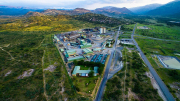
A new report by researchers from Imperial College London, commissioned by the Mayor Sadiq Khan, has found a link between a person’s exposure to air pollution and the severity with which
they will experience the effects of COVID-19.
There is growing evidence linking exposure to air pollution with the worst effects of COVID-19 and this new review, led by Imperial’s Environmental Research Group and commissioned through Imperial Projects, provides a comprehensive overview of the best recent evidence and shows some evidence that past exposure to toxic air leads to more severe cases of COVID-19.
The Mayor believes it is clear from this emerging evidence that reducing air pollution is crucial to helping build resilience to COVID-19 and other infectious diseases and it is vital we take bold action now to tackle poor air quality. Sadiq has pledged to be the greenest Mayor London has ever had, with a mandate from Londoners to put environment and climate policies at the heart of his second term in office. The central London ULEZ has reduced nitrogen dioxide roadside concentrations by nearly a half and the number of state schools located in areas exceeding legal limits has reduced from 455 in 2016 to 14 today. It has also led to reductions that are five times greater than the national average. Later this year, the Ultra Low Emission Zone will be expanded up to the North and South Circular in a crucial step in London’s green recovery. As part of that recovery, the Green New Deal will help London to become greener and fairer by creating new jobs and skills for Londoners, ensuring London becomes a net zero-carbon city by 2030 and a zero-waste city by 2050. Sadiq’s Green New Deal fund is already investing £10 million in programmes that support around 1,000 green jobs, while tackling the climate emergency and inequalities.
The review confirmed that:
- Exposure to air pollution before the pandemic increased the risk of hospital admissions if a person became infected with COVID-19 in a small number of good quality studies. This is most likely because air pollution contributes to people having heart or lung disease and they then become sicker from COVID-19 if they catch it.
- Exposure to air pollution might increase the likelihood of contracting COVID-19 if you are exposed to the coronavirus. This finding comes from a few studies that found that pollutants, once inhaled into the lungs of animals, increase the amounts of the protein that allows the coronavirus to attach to the lung cells. However, human population studies of air pollution and new cases were poor quality and inconclusive.
- More widely, there is pre-existing evidence that exposure to air pollution increases susceptibility to, and worsens the outcome from, a range of infectious lung diseases, such as pneumonia and bronchitis.
The Mayor of London, Sadiq Khan, said: “We already know that air pollution is linked to life-changing illnesses, such as cancer, lung disease and asthma. But until now previous studies have underestimated the role air pollution plays in infectious diseases like pneumonia, bronchitis and most recently COVID-19.
“This new review led by Imperial researchers makes it crystal clear that tackling air pollution is a vital part of building our resilience to COVID-19, and other infections like it. The decisions we make now to tackle air pollution are truly a matter of life and death.
“We cannot turn a blind eye to the clear evidence showing the dangers of toxic air pollution. That’s why I’m committed to expanding the Ultra-Low Emission Zone next month, and why I will continue to take the bold action necessary to eradicate pollution from our city.”
The publication of the report follows research by scientists in the US linking smoke from the recent devastating wildfires with an increase in hospital admissions and deaths from COVID-19.
Imperial researchers evaluated studies from all over the world and their findings have significance far beyond the implications for London. Globally, around seven million deaths a year are linked to air pollution, according to the World Health Organization, making it the biggest environmental killer.
Both air pollution and COVID-19 compound existing inequalities in society. Previous research has shown that those exposed to the worst air pollution are more likely to be deprived Londoners from low income backgrounds who are least likely to own a car. Those living in areas with high levels of pollution are also disproportionately likely to be from Black, Asian and minority ethnic communities. Multiple studies have confirmed that people from Black, Asian and minority ethnic backgrounds in the UK are disproportionately becoming infected and dying from COVID-19*. A Public Health England report** in June found that the highest coronavirus diagnosis rates were among Black people and that people from Black and Asian ethnic groups were twice as likely to die from COVID-19 compared to White people.
Historically, air pollution has been most associated with non-infectious (or “non-communicable”) diseases that can't be directly transmitted between people. For example, there is extensive and growing evidence that air pollution may contribute to heart and lung diseases. Until now, the role air pollution plays in increasing the risk of infectious respiratory diseases, including acute bronchitis in children and pneumonia, has been overlooked and underestimated in developed countries. This new study highlights that more research is urgently needed in this area.
Currently, most UK studies that evaluate the cost of air pollution, including health outcomes, economic costs and premature deaths, do not consider infectious diseases of the lungs. It is therefore likely that current estimates do not reflect the true cost of air pollution.
Prof. Ally Lewis, Chair of the Government’s Air Quality Expert Group, said: “It is becoming ever clearer that living in an environment with improved air quality would likely lead to better health outcomes when faced with COVID-19. The exact mechanisms are still not yet fully resolved yet, but sufficient evidence has been reviewed to be confident that long-term exposure to air pollution both increases risk of respiratory diseases and is responsible causing many other health conditions that make COVID-19 more severe. Air quality certainly isn’t the only factor that raises the risk of a poor outcome from COVID-19 but it is something we can take collective action on now through reducing our emissions.”
Prof. Paul Plant, Public Health England’s deputy director for London, said: “This is a welcome review of the literature with important tentative conclusions on the potential links between poor air quality and COVID-19. Poor air quality particularly affects people who are more vulnerable to respiratory harm including those with heart and lung disease, children and the elderly, and exacerbates health inequalities. Improving air quality is crucial to reducing the health impacts of air pollution across London and will help people live longer, healthier lives beyond the pandemic.” Photo by Cecilia Piovan, Wikimedia commons.






































